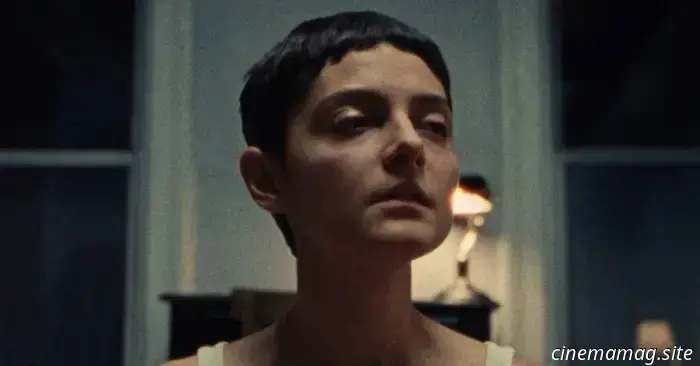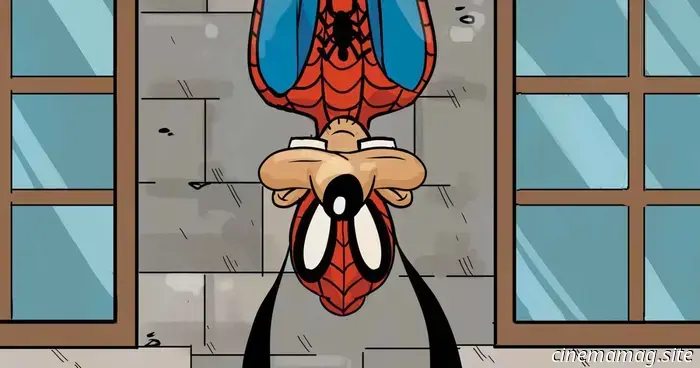
Gazer Review: A Mesmerizing and Unique Directorial Debut
One might be inclined to compare Gazer to many films it alludes to. For example, there’s Memento, Christopher Nolan’s landmark film about a man who cannot create short-term memories and gets entangled in a dark criminal world. Although Ryan J. Sloan’s directorial debut doesn't employ such a groundbreaking structure, its hazy 16mm aesthetic and captivating narrative achieve something just as significant: it establishes a clear directorial perspective.
Ariella Mastroianni (who is also a co-writer) plays Frankie, a single mother introduced while working the night shift at a gas station. She suffers from dyschronometria, a degenerative brain condition that alters her sense of time and critically leads to blackouts. To ground herself in the present, she listens to cassette tapes that repeat affirmations and mantras, instructing her to rewind if she feels a blackout approaching. Additionally, she participates in a support group for those who have lost loved ones to suicide, where she encounters Claire (Renee Gagner), the film’s femme fatale. Much like in classic noir, Claire appears to be in distress and offers Frankie a significant sum for a small favor: to break into her apartment, retrieve some keys, and drive a car to the Meadowlands.
However, things are never quite that simple, much like Gazer itself. Sloan cleverly plays with the built-in tension surrounding a woman who can’t reliably gauge the passage of time, seamlessly transitioning from day to night as both Frankie and the audience start to feel at ease. The threat of Frankie zoning out is amplified during a tense scene where she has to hide under a bed during the break-in, intensifying the suspense. Mastroianni delivers an outstanding performance, portraying Frankie with the perfect blend of determination and the fragility of someone on the verge of collapse.
A creeping sense of paranoia develops, supported by Sloan’s chilling visuals and a dark, jazzy score by Steve Matthew Carter. Gazer explores how we perceive things happening right before us and how we envision other individuals. It’s significant that one of the most frequently heard phrases in Frankie’s tapes is “Focus. What do you see?”—a question that becomes increasingly intricate as the mystery unfolds. In such instances, Gazer transcends being merely an aggregation of its influences and becomes its own entrancing entity, drawing you further into its intrigue.
Less effective, though still well-shot, are several dream sequences that reference creators from Lynch to Videodrome. These sequences don’t disrupt the meticulously established atmosphere as much as they seem somewhat forced, as if Sloan aimed to incorporate all his ideas. While the film concludes on an intriguingly ambiguous note, it doesn’t quite achieve the expansive thematic depth of Memento, resorting instead to summarizing the plot. Nevertheless, even with its missteps, Gazer remains an undeniably unique experience. One of the highest praises that can be given is that it leaves viewers eager for whatever Sloan and Mastroianni will undertake next.
Gazer is set to be released in theaters on Friday, April 4.
Other articles
-Movie-Review.jpg) A Review of the Minecraft Movie (2025)
A Minecraft Movie, set to release in 2025, is directed by Jared Hess. The cast includes Jason Momoa, Jack Black, Danielle Brooks, Emma Myers, Sebastian Hansen, Jennifer Coolidge, Rachel House, Matt Berry, Kate McKinnon, Jemaine Clement, Valkyrae, Jared Hess, and Jens Bergensten. SYNOPSIS: Four outsiders find themselves abruptly transported through a mysterious portal into an extraordinary, cubic world that flourishes on creativity. To […]
A Review of the Minecraft Movie (2025)
A Minecraft Movie, set to release in 2025, is directed by Jared Hess. The cast includes Jason Momoa, Jack Black, Danielle Brooks, Emma Myers, Sebastian Hansen, Jennifer Coolidge, Rachel House, Matt Berry, Kate McKinnon, Jemaine Clement, Valkyrae, Jared Hess, and Jens Bergensten. SYNOPSIS: Four outsiders find themselves abruptly transported through a mysterious portal into an extraordinary, cubic world that flourishes on creativity. To […]
 Sam Mendes' The Beatles - A Four-Film Cinematic Event announces cast and release dates.
Just over a year after the initial announcement that director Sam Mendes (American Beauty, 1917) was working on four distinct films centered around The Beatles, Sony has now officially revealed the release dates for The Beatles — A Four-Film Cinematic Event, along with announcing the actors who will portray the iconic band.
Sam Mendes' The Beatles - A Four-Film Cinematic Event announces cast and release dates.
Just over a year after the initial announcement that director Sam Mendes (American Beauty, 1917) was working on four distinct films centered around The Beatles, Sony has now officially revealed the release dates for The Beatles — A Four-Film Cinematic Event, along with announcing the actors who will portray the iconic band.
 Goofy swings through the web like Spider-Man in the Marvel & Disney: What If...? one-shot.
Marvel has revealed that Goofy will be the focus of the upcoming Disney mash-up this July, as writers Riccardo Secchi and Steve Behling, along with artist Francesco D’Ippolito, reinterpret the origins of Spider-Man in the classic Amazing Fantasy #15 by Stan Lee and Steve Ditko, through the one-shot Marvel & Disney: What If…? Goofy […]
Goofy swings through the web like Spider-Man in the Marvel & Disney: What If...? one-shot.
Marvel has revealed that Goofy will be the focus of the upcoming Disney mash-up this July, as writers Riccardo Secchi and Steve Behling, along with artist Francesco D’Ippolito, reinterpret the origins of Spider-Man in the classic Amazing Fantasy #15 by Stan Lee and Steve Ditko, through the one-shot Marvel & Disney: What If…? Goofy […]
 Warfare Review: A Unique Specimen of a Combat Procedure
The initial visuals of warfare originate from the 2004 music video for Eric Prydz’s "Call On Me," which pays homage to 1980s aerobics. This catchy dancehall hit, while somewhat grating, undeniably complements Madonna’s last major hit, "Hung Up," in both sound and imagery. The short-lived surge of Daft Punk-inspired Top 40 music is likely a reference point for many millennials regarding
Warfare Review: A Unique Specimen of a Combat Procedure
The initial visuals of warfare originate from the 2004 music video for Eric Prydz’s "Call On Me," which pays homage to 1980s aerobics. This catchy dancehall hit, while somewhat grating, undeniably complements Madonna’s last major hit, "Hung Up," in both sound and imagery. The short-lived surge of Daft Punk-inspired Top 40 music is likely a reference point for many millennials regarding
 Richard Linklater’s Nouvelle Vague and Blue Moon Scheduled for Fall Releases
Following the release of two films last year, Hit Man and the somewhat ignored God Save Texas: Hometown Prison, the highly productive Richard Linklater is set to return in 2025 with two additional features. Earlier this year, he debuted Blue Moon (featuring Ethan Hawke, Margaret Qualley, Bobby Cannavale, and Andrew Scott) at Berlinale. Now, Sony Pictures Classics has announced at the official CinemaCon.
Richard Linklater’s Nouvelle Vague and Blue Moon Scheduled for Fall Releases
Following the release of two films last year, Hit Man and the somewhat ignored God Save Texas: Hometown Prison, the highly productive Richard Linklater is set to return in 2025 with two additional features. Earlier this year, he debuted Blue Moon (featuring Ethan Hawke, Margaret Qualley, Bobby Cannavale, and Andrew Scott) at Berlinale. Now, Sony Pictures Classics has announced at the official CinemaCon.
 Lionsgate reveals the title treatment for The Hunger Games: Sunrise on the Reaping.
During its presentation at CinemaCon this week, Lionsgate has officially revealed its feature film adaptation of The Hunger Games: Sunrise on the Reaping, the newest novel in Suzanne Collins' The Hunger Games series. Along with the film’s title treatment, Lionsgate also provided a short synopsis, stating: The Hunger Games: […]
Lionsgate reveals the title treatment for The Hunger Games: Sunrise on the Reaping.
During its presentation at CinemaCon this week, Lionsgate has officially revealed its feature film adaptation of The Hunger Games: Sunrise on the Reaping, the newest novel in Suzanne Collins' The Hunger Games series. Along with the film’s title treatment, Lionsgate also provided a short synopsis, stating: The Hunger Games: […]
Gazer Review: A Mesmerizing and Unique Directorial Debut
It's easy to draw comparisons between Gazer and several of the films it references. To begin with, there's Memento, Christopher Nolan's groundbreaking movie about a man who struggles to create short-term memories while entangled in a sordid criminal world. Although Ryan J. Sloan's debut lacks such an unconventional format, it does share a dreamy 16mm appearance and
